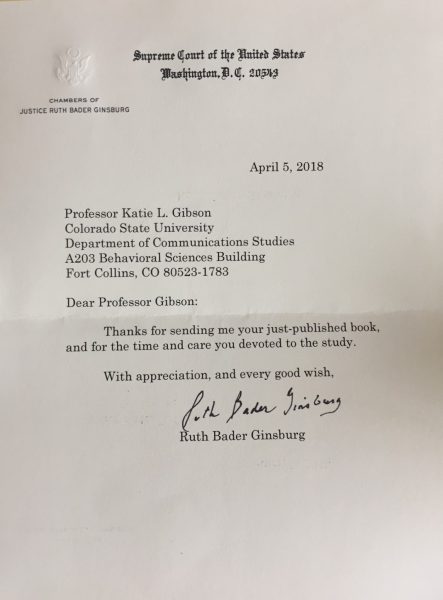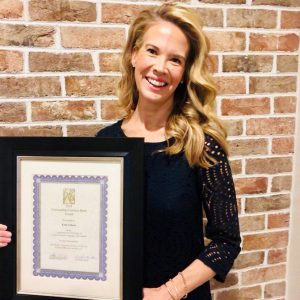The Organization for the Study of Communication, Language, and Gender has awarded Associate Professor Katie Gibson its 2018 Outstanding Book Award for Ruth Bader Ginsburg’s Legacy of Dissent: Feminist Rhetoric and the Law, published last March. Gibson received the award Saturday, October 6, at the organization’s 41st annual conference held in South Lake Tahoe, Nevada.
“My book argues that Ginsburg’s remarkable legal legacy rests upon her consistent and direct challenge to the law’s traditional voice,” Gibson said. “From her advocacy on behalf of women’s rights in the 1970s through her tenure on the US Supreme Court, my research demonstrates how Ginsburg’s voice of dissent has reshaped how the Constitution speaks to gender equality and has carved out a space for citizens who are often excluded and silenced by the traditional voice of the law.”

Gibson began researching Ruth Bader Ginsburg as a graduate student in 2002, focusing on the justice’s legal opinions, and began writing the book in 2013. She examines the language used by RBG in milestone cases such as Reed v. Reed, in 1971, when the Supreme Court held that the law’s dissimilar treatment of men and women was unconstitutional.
“Ruth Bader Ginsburg wrote the brief for that case and it was the first time the Supreme Court ruled that a sex classification was unconstitutional,” Gibson said. “That was a watershed case, and you can look at her language and legal argument in that early brief and see them as seeds of a strategy that she develops over the years.”
Gibson argues that Justice Ginsburg’s legal voice challenges the traditional voice of the law and encourages a broader understanding of our constitutional community that is more inclusive and more just.
“The traditional voice of the law speaks in a language of sweeping universals and that is easy language to hide biases within,” said Gibson. “When RBG talks about women’s rights, she insists on speaking in a language of context. She draws focused attention to differences among women—from the realities of poverty and domestic abuse to the financial strain of trying to find child care—in ways that weren’t ever voiced before.”
Gibson received her Ph.D. in Communication Arts and Sciences, from The Pennsylvania State University. She began her teaching career at California State University, Long Beach, in 2004 and joined CSU as an Associate Professor of the Communication Studies Department in 2012. She teaches many courses on campus including Rhetoric and Social Movements, Gender and Communication, Rhetorical Criticism, and Academic Writing.
Organization for the Study of Communication, Language & Gender
 OSCLG–the Organization for the Study of Communication, Language and Gender–has grown from a series of interdisciplinary conferences that began at Bowling Green State University in 1978. Since that time, the organization has sought to provide a forum for professional discussion, presentation of research, and demonstration of creative projects in the areas of communication, language, and gender, and to promote the recognition of those doing work in this area.
OSCLG–the Organization for the Study of Communication, Language and Gender–has grown from a series of interdisciplinary conferences that began at Bowling Green State University in 1978. Since that time, the organization has sought to provide a forum for professional discussion, presentation of research, and demonstration of creative projects in the areas of communication, language, and gender, and to promote the recognition of those doing work in this area.
An annual conference supports the mission of OSCLG, and awards were presented last Saturday during the conference to honor Gibson and other individuals who contribute to the study of communication, gender, and language.
“It’s exciting when your colleagues celebrate the quality of your work, especially after the very long process of writing a book,” Gibson said. “This award means a lot to me. I really appreciate the recognition from OSCLG.”